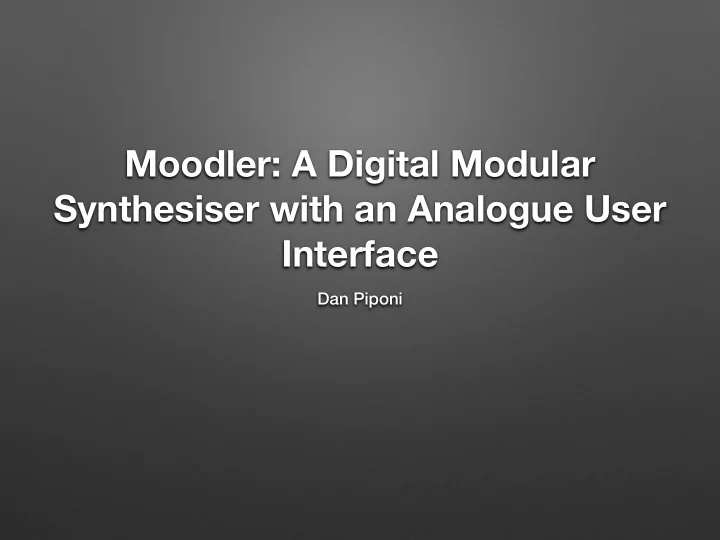

Moodler: A Digital Modular Synthesiser with an Analogue User Interface Dan Piponi
Two starting points Number 1: LittleBits Synth Kit As a Physically-embodied, Domain Specific Functional Programming Language Noble, James and Jones, Timothy.
Two starting points Number 2:
Let’s dive in… • Standard synth example ( demo_test_full_synth ) • Stand alone multisaw example ( test_demo_multisaw )
Let’s dive in… • Physical and virtual user interfaces • Cables and knobs • MIDI • OSC • GUI written entirely in Haskell • Back end written almost entirely in Haskell generating, compiling and linking C code on fly.
Overview USB/ UI Serial-OSC Mock Bridge Modular MIDI-OSC Moodler Bridge
Decisions, decisions… • Want to exploit existing libraries • Want graphic user interface • Want to talk various protocols: USB/Serial, MIDI • Want fast generation and compilation of fast code
Code Structure GUI UI plugins Shared Audio Moodler library plugins
Haskell • I can program in it • Great fit for code generation, FFI, dlopen, C parser and representation, GHC accessible through library. • Don’t quite trust it for devices other than network. But OSC rests on TCP/IP so delegate MIDI and USB/Serial to external applications and audio to C. • Not convinced by existing GUI offerings but I don’t mind drawing everything myself: gloss. Not perfect fit but does what it promises well.
C • I can program in it • If I used LLVM I’d still need to write a compiler to generate LLVM. I think of clang as an API to generate LLVM. • Plenty of existing C audio code to borrow. • I want to eventually generate standalone but hackable code for microcontrollers.
Code Structure GUI UI Haskell Haskell plugins C Shared Audio C Moodler library plugins Haskell
.msl Plugins double result; void init() { } void fini() { } inline void exec(in __attribute__((normal(1.0))) control cv, in sample signal, out sample result) { result = cv*signal; }
.msl Plugins double result; void init() { } void fini() { } inline void exec(in __attribute__((normal(1.0))) control cv, in sample signal, out sample result) { result = cv*signal; }
.hs Plugins do plane <- currentPlane p <- mouse panel <- container' "panel_2x1.png" p (Inside plane) lab <- label' "vca" (p+(-36.0,84.0)) (Outside panel) name <- new' "vca" inp <- plugin' (name ! "cv") (p+(-24,24)) (Outside panel) setColour inp "#control" inp <- plugin' (name ! "signal") (p+(-24,-24)) (Outside panel) setColour inp "#sample" out <- plugout' (name ! "result") (p+(24,0)) (Outside panel) setColour out "#sample" recompile return ()
A minimal synth
Generated C code void execute(struct State * state, double * buffer) { for (int i = 0; i < 256; ++i) { state->id5.result = state->input13.result; state->id12.result = state->input19.result; state->sum21.result = state->id5.result + state->id12.result; state->id7.result = 0; audio_saw_exec(state->sum21.result, state->id7.result, &state->audio_saw1); state->id10.result = state->audio_saw1.result; adsr_exec(state->input15.result, state->input16.result, state->input18.result, state->input17.result, state->input20.result, &state->adsr0); state->vca22.result = state->adsr0.result * state->id10.result; buffer[2 * i] = state->vca22.result + 0; buffer[2 * i + 1] = state->vca22.result + 0; } }
From .msl… double last_up; double last_down; double multiplier_up; double multiplier_down; double result; void init() { last_up = -1.0; last_down = -1.0; } void exec(in control decay_up, in control decay_down, in control input, out control result) { if (result > input) { if (decay_down != last_down) { multiplier_down = exp(-dt/max(0.001, decay_down)); } result = input+multiplier_down*(result-input); last_down = decay_down; } else if (result < input) { if (decay_up != last_up) { multiplier_up = exp(-dt/max(0.001, decay_up)); } result = input-multiplier_up*(input-result); last_up = decay_up; } }
…to C void vactroid_exec(double decay_up, double decay_down, double input, struct vactroid * vactroid) { if (vactroid->result > input) { if (decay_down != vactroid->last_down) { vactroid->multiplier_down = exp(-dt / max(0.001, decay_down)); } vactroid->result = input + vactroid->multiplier_down * (vactroid->result - input); vactroid->last_down = decay_down; } else if (vactroid->result < input) { if (decay_up != vactroid->last_up) { vactroid->multiplier_up = exp(-dt / max(0.001, decay_up)); } vactroid->result = input - vactroid->multiplier_up * (input - vactroid->result); vactroid->last_up = decay_up; } }
UI Control Flow OS/GUI User Code User Code OS/GUI Callback Return Return Call Callback Return Return Call
Reinversion of Control Two approaches do e <- getEvent do case e of … e <- getEvent …do stuff … case e of … …do stuff … This continuation is established as a callback and control is relinquished to GUI Free monad builds tree. getEvent Semantics provided by interpreter that runs a small step at a time in getEvent callback. Another free monad is also used for .hs plugin to get complete separation of plugin code from getEvent Moodler internals.
Recognising cables Each output has unique square wave signal
Permutations with Cables delay delay delay delay U
Permutations with Cables U Householder Reflection
Permutations with Cables
Live code? • Or maybe a canned example ( demo_test_bitwise )
Thanks • Barnaby Robson for porting to PortAudio and Oscilloscope.
Recommend
More recommend